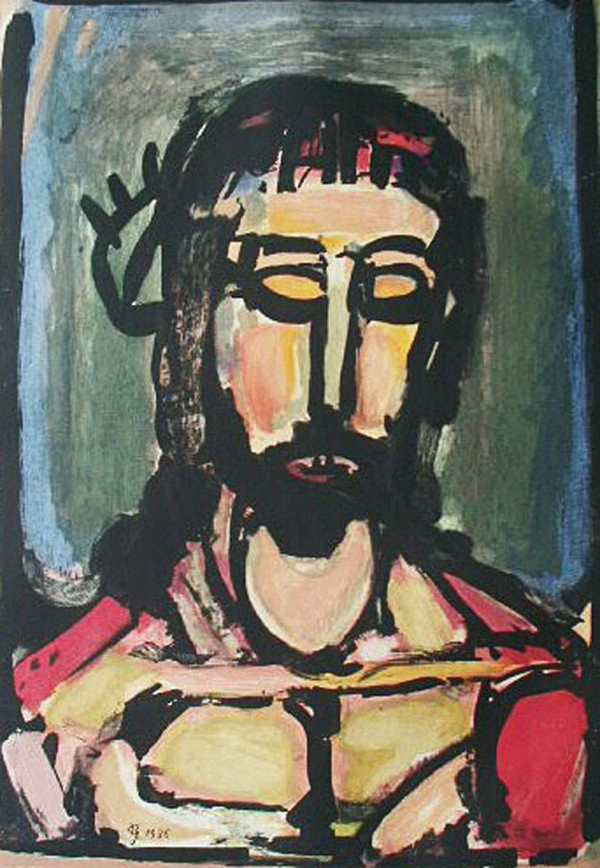Crafting a Theology of Disability
Jared Ortiz, Ph.D. | Assistant Professor of Religion
When his 7-year-old son Benedict was diagnosed with autism at the age of 3, it set Dr. Jared Ortiz on a personal, impassioned research track.

Plate eight from the Passion, 1936
“I did a lot of reading, and there are wonderful resources in the Holland area, so we’ve been very blessed,” Ortiz says regarding his son’s condition. “What I found in the readings is that there’s a lot of practical advice for working with children with autism, but there’s not a lot of good theological perspective on it.”
What he did find proved “very frustrating” because even renowned theologians tend to rely on secular categories for disability, Ortiz says — which he finds problematic from a Christian point of view.
“In much of the literature, there is an unwillingness to say what disability is, or even to say that one might be sad about it, or might suffer from it,” Ortiz says.
Inspired by the Mellon Grand Challenges Initiative at Hope, which encourages multi-disciplinary course development focused on key contemporary themes, Ortiz aligned with three other Hope professors to address the topic of disability from their respective disciplines. He and the other faculty members — historian Dr. Wayne Tan, psychologist Dr. Alyssa Cheadle and social work professor Dr. Dennis Feaster — taught their new courses for the first time in the fall 2017 semester, sharing syllabi and guest lecturing in each other’s classes.
Ortiz took an inventive approach to final preparations. He organized a six-week summer lunchtime reading series open to all Hope faculty and staff.
“I picked readings under 20 pages that dealt with theology and disability, and just blasted the whole campus: ‘This is what we’re reading, please come,’” says Ortiz. “I had no idea if anybody would show up, but we had 10 to 20 people each time. I was surprised by who was interested. Many came because they had a personal connection to disability — a sister with cerebral palsy or an aunt with Down syndrome.”
“I told them, ‘This is not for experts. I’m not an expert in this field either, I’m just learning.’ And it was great.”
His takeaway? “There is clearly a felt need to explore how to think about disability in a Christian way. But I also saw a tension between theologians who were willing to say that disability is a result of living in a fallen world and those who wanted to avoid that conclusion altogether. More work needs to be done both to understand and to share a robust Christian understanding of disability.”
In March, Ortiz will synthesize his readings on disability in a talk for a by-invitation-only colloquium at the ecumenical Chicago Theological Society.
Summer Reading List
Berkman, John. “Are Persons with Profound Intellectual Disabilities Sacramental Icons of Heavenly Life? Aquinas on Impairment.” Studies in Christian Ethics 26, no. 1 (2013): 83-96.
doi:10.1177/0953946812466494.
Gnocchi, Carlo. The Pedagogy of Innocent Suffering. Translated by Nathaniel Dreyer. IVE Press, 2017.
Hauerwas, Stanley. “Disability: An Attempt to Think With.” Fontbonne University, St. Louis Missouri. Accessed February 9, 2018.
https://www.fontbonne.edu/wp-content/uploads/2015/10/2011.pdf.
Nouwen, Henri J. M. “Adam’s Story: The Peace That is Not of This World,” in Seeds of Hope: A Henri Nouwen Reader. Edited by Robert Durback. London: Darton, Longman Todd, 1998.
Picard, Andrew, and Myk Habets, eds. Theology and the experience of disability: interdisciplinary perspectives from voices down under. London ; New York: Routledge, 2016.
Swinton, John. “From Inclusion to Belonging: A Practical Theology of Community, Disability and Humanness.” Journal of Religion, Disability & Health 16, no. 2 (2012): 172-90.
doi:10.1080/15228967.2012.676243.
